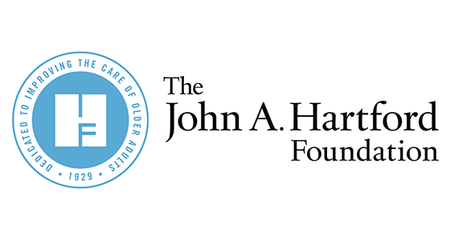New Grants Totaling Over $3 Million Approved by JAHF Board of Trustees

The John A. Hartford Foundation Board of Trustees approved four grants totaling $3,438,988 that will spread age-friendly care through consulting pharmacists, accelerate adoption of evidence-based comprehensive dementia care programs, help family caregivers of people living with dementia find support programs and continue to disseminate resources to improve care for people with complex health and social needs.
Leveraging Pharmacists as Age-Friendly 4Ms Champions ($1,888,988 for 3 years)
American Society of Consultant Pharmacists (ASCP)
To help older adults and those who care for them navigate the complexities of managing medications, this initiative will incorporate the expertise of long-term care pharmacies and pharmacists who specialize in the care of older adults into the Age-Friendly Health Systems movement. Funding will support the American Society of Consultant Pharmacists to educate and foster pharmacy champions in the 4Ms Framework for age-friendly care by forming a national advisory council, creating a medication optimization learning collaborative across eight regions, training 2,500 pharmacists and 950 long-term care pharmacies, and having at least 250 of those pharmacies earn Age-Friendly Health Systems recognition.
Rapid Dissemination of Evidence-Based Comprehensive Dementia Care Models ($900,000 for 18 months)
Education Development Center (EDC)
The Education Development Center
will coordinate with the developers of six evidence-based comprehensive dementia care programs to rapidly respond to increasing demands for dementia services and a new payment model launched by the Centers for Medicare and Medicaid Services (CMS) Innovation Center. The Guiding an Improved Dementia Experience (GUIDE) Model was announced by CMS in 2023 to test alternative ways for Medicare to pay for comprehensive dementia care that includes support for family caregivers. This grant will bring together the developers of established comprehensive dementia care programs to define dissemination strategies, establish standards and tools, and conduct training to accelerate the adoption of evidence-based programs under the new GUIDE payment model. The collaborating evidence-based programs include: the Benjamin Rose Institute Care Consultation (BRI-CC)TM, Care Ecosystem, Eskenazi Healthy Aging Brain Center (HABC 3.0), Integrated Memory Care (IMC), Maximizing Independence (MIND) at Home and the UCLA Alzheimer’s and Dementia Care (ADC) Program.
Dissemination of the Consumer Version of Best Practice Caregiving ($450,000 for 2 years)
Benjamin Rose Institute on Aging
This grant will support dissemination and ongoing sustainability of the public version of Best Practice Caregiving, an online resource to be launched in January 2024 that will help family and friend caregivers of people living with dementia find proven, culturally appropriate support programs in their communities. In 2021, JAHF supported the development of this resource for the public following the successful creation of Best Practice Caregiving for professionals and provider organizations seeking to implement evidence-based dementia caregiving support programs for the populations they serve.
Development of the Better Care Playbook, Phase VII ($200,000 for 2 years)
Center for Health Care Strategies (CHCS)
Through a seven-foundation collaborative committed to improving care for people with complex health and social needs, the Center for Health Care Strategies (CHCS) will continue the development and dissemination of the Better Care Playbook, a robust online set of resources used by health systems, payers, and policymakers to increase the adoption of evidence-based models and practices. These resources include Foundation-funded programs and priorities such as home-based care models, nursing home quality, and equitable care for rural populations. This next phase will aim to translate the evidence on complex care for policymakers looking to implement effective policies and programming and develop strategies toward long-term sustainability of the Playbook.
